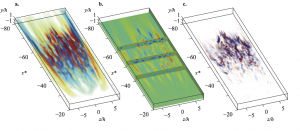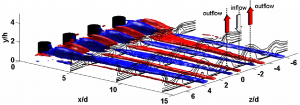Collaborators : J. E. Wesfreid (DR Emérite CNRS), Grégoire Lemoult (PhD student from 2010 to 2013), Tristan Cambonie (PhD student from 2008 to 2011), Thomas Duriez (PhD student from 2005 to 2009).
Hydrodynamic instabilities
Instabilities of a Jet-In-Crossflow (JICF) in collaboration with T. Cambonie
When a vertical jet interacts with an incoming boundary layer, the jet will undergo various transitions depending on the value of velocity ratio between the jet velocity and the freestream velocity of the boundary layer. A nice example is shown below with the creation of a serie of hairpin vortices :
Transition to turbulence in shear flows
Subcritical transition to turbulence in a Plane Poiseuille Flow (PPF), with G. Lemoult and J. E. Wesfreid
Visualization of a the structure of a turbulent spot growing in the subcritical régime :

Visualisation of the nucleation of a turbulent spot growing in the PPF after an initial pulse in the middle of the channel :
Self-Sustained Process (SSP) in boundary layer with T. Duriez and J. E. Wesfreid.
We have shown experimentally that the SSP is indeed a key mechanism in the transition to turbulence of wall-bounded shear flows. It was achieved using small cylinders to force the transition of a subcritical boundary layer :

Creation of streaks of high and low streamwise velocity downstream the cylinders.
